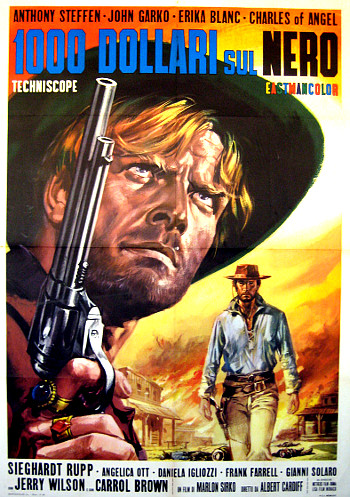 Anthony Steffen plays Johnny Liston, who heads home after a 12-year stint in prison, determined to find out who was responsible for framing him for a murder he didn’t commit.
Anthony Steffen plays Johnny Liston, who heads home after a 12-year stint in prison, determined to find out who was responsible for framing him for a murder he didn’t commit.
He finds his brother, Sartana (Gianni Garko) leading a band of hoodlums and lording over three towns — Campos, Blackstone Hill and Wishville — forcing the terrified residents to pay “for his protection.”
Oh, and he’s also taken Johnny’s former love, Manuela, as his woman. And he’s turned her now-mute brother Jerry into a sort of slave.
The brothers’ mother (Carla Calo) fully supports Sartana’s actions. After all, she was a servant until his rise to power. Now she’s mistress over the largest home in town and everyone at least pretends to respects her.
Joselita Rogers, the pretty daughter of the man Johnny was to have killed, is far less approving. She’s also suspicious of Johnny’s motives when he offers a helping hand.
Johnny soon realizes his brother’s rein of terror needs to end. And he soon suspects the judge whose testimony helped send him away might not be the upstanding citizen everyone thinks he is.
Better than average Spaghetti, hysterical in tone, featuring a deliciously over-the-top performance by Gianni Garko as the villain in his first Euro-Western.
He and his men live in what appears to be an abandoned adobe temple, raiding as they please and riding from town to town to force residents to pay for protection.
The cast includes Carla Calo as mother of Sartana and Johnny, a larger role than you’ll usually find for an older female actress (she was 39 at the time of the film’s release, but playing a character older than that).
In fact, this film features four prominent female roles — Erika Blanc as the daughter of the man Johnny supposedly killed, Angelica Ott as his former lover who’s now under Sartana’s control, and Daniela Igliozzi as Mary, a childhood friend of Jerry Holt.
Adding to the flavor is Cardone’s direction, with our key protagonists filmed from all sorts of imaginative angles.
Directed by:
Alberto Cardone
as Albert Cardiff
Cast:
Antonio De Teffe … Johnny Liston
as Anthony Steffen
Gianni Garko … Sartana Liston
as John Garko
Carla Calo … Rhonda Liston
as Carol Brown
Erika Blanc … Joselita Rogers
Franco Fantasia … Sheriff
as Frank Farrell
Eighardt Rupp … Ralph
Angelica Ott … Manuela Holt
Roberto Miali … Jerry Holt
as Jerry Wilson
Carlo D’Angelo … Judge Wood
as Charlie of Angel
Daniela Igliozzi … Mary
Gianni Solaro … Foster
aka:
Mille dollari sul nero
Blood at Sundown
Sartana: Sangue e la penna
Sartana: Blood at Sundown
Composer: Michele Lacerenza
Memorable lines:
Johnny to Joselita, after rescuing her from an ambush: “They were really after you. Now what’s this all about?”
Joselita: “Oh, it’s nothing. Nothing at all. I guess I owe you my life.”
Johnny Liston: “I wasn’t the one who killed Edward Rogers.”
Rhonda Liston, his mother: “I know you weren’t. You need guts to kill.”
Rhonda Liston, admiringly: “Your brother (Sartana) moves like a general.”
Johnny Liston, when the judge alerts him to the kidnapping of Joselita Rogers: “You always bring good news, judge. I almost feel like sewing your lips together, permanent!”
Johnny Liston to the judge: “If your teeth keep chattering so loud, you’re going to wake up everybody.”
Sartana Liston to Johnny, after his men have beaten him: “And this finishes your career as a pain in the neck, brother dear.”
Sartana, after Johnny escapes: “Before sundown, there’s going to be a bloodbath in this valley!”
Townswoman to Rhonda Liston, as Sartana and his men ravage Campos: “We’re asking you to help us. We beg you to help us.”
Rhonda Liston: “Get on your knees. Beg for it on your knees.”
Trivia:
This film marked Gianni Garko’s debut as a character named Sartana, but the crazed bandit he plays bears no resemblance to the mysterious black-clad avenger that appeared in 1968’s “If You Meet Sartana, Pray for Your Death.” Nevertheless, this film was reissued as “Blood at Sundown” and “Sartana: Blood at Sundown” to capitalize on the success of the official Sartana films.
In the early 1970s, Angelica Ott starred in a pair of Alaskan adventure films — “Hellhounds of Alaska” and “Cry of the Black Wolves.” Both were made in Germany and directed by Harald Reinl of Winnetou fame.
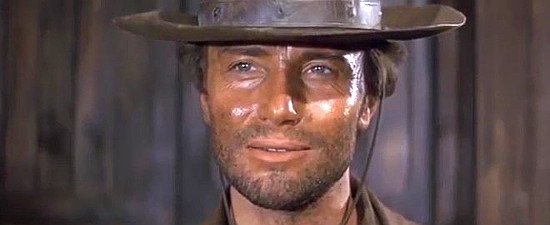
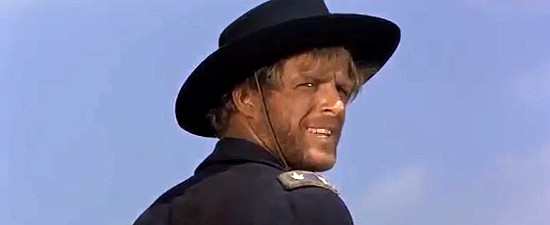

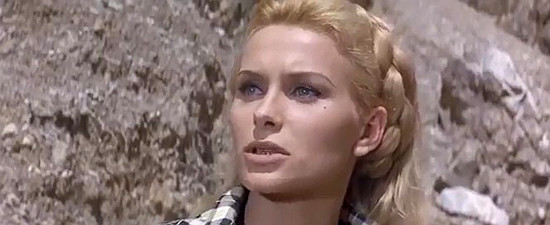
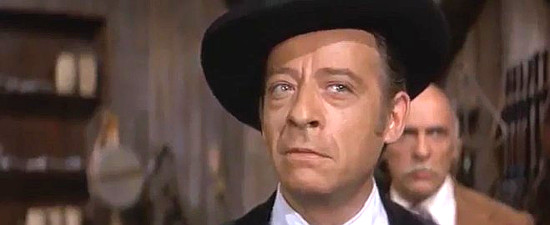
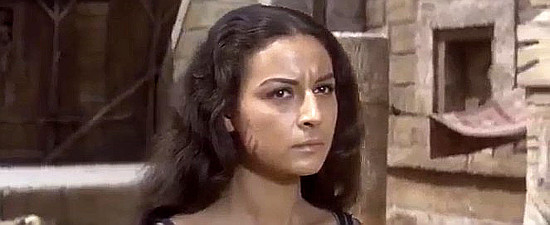
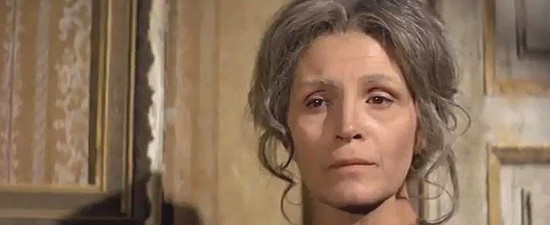
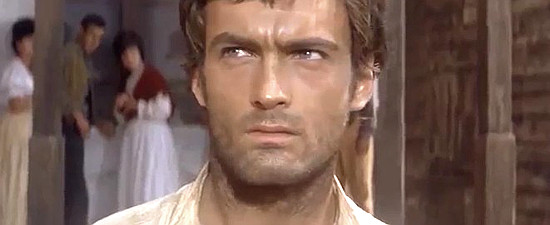
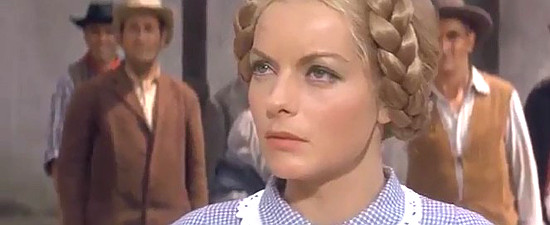
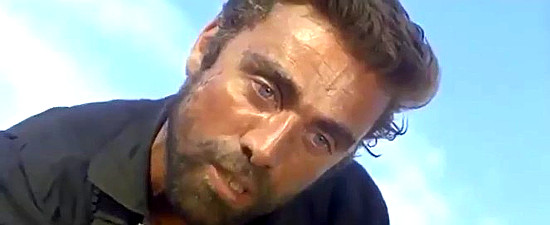
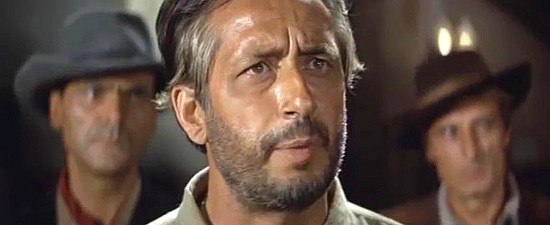

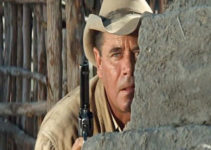
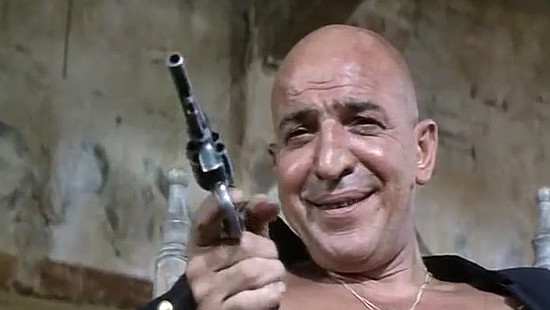
Angelica Ott portrays Mary
Daniela Igliozzi portrays Manuela Holt
Thank you very much for that information!